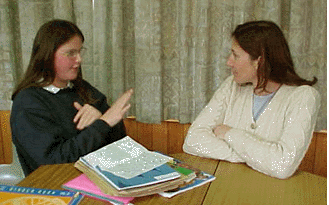The Claremont Project caters for Deaf and Hearing Impaired students in the greater Hobart area. The Project provides a program for children from age of diagnosis through to grade twelve at three different campuses; Claremont Primary School, Claremont High School and Claremont College. The aim of the program is to provide support to enable these students to be fully functioning and equal members of their regular class within the context of a bilingual-bicultural approach.Staff involved in The Claremont Project believe the aim of integration is not to make disabled people 'normal' but to allow them the same opportunities and choices as their hearing peers. The development of the program has been strongly influenced by the belief that successful integration will entail adapting the mainstream. Hence parents and siblings sign with their deaf children; most hearing students in the Claremont Schools sign; regular classroom teachers have modified their teaching styles; work given to students may be modified to suit the particular needs of an individual; interpreters are provided for all academic, sporting and social aspects of the schools.
The Claremont Project has been shaped by the following strongly held views:
1. Deaf students have a right to equal access to regular education.
2. Deaf students, their parents and their regular teachers will need extra support to allow this to happen.
3. Deaf students have a right to be with other deaf students and adult members of the Deaf community if they so choose.
4. Deaf students have a right to develop their identity as Deaf people rather than 'impaired' hearing people.The Claremont Project is a bilingual-bicultural program which rejects the notion that Deaf people must perform in exactly the same way as hearing people and be judged a success or failure on this criterion. A bilingual-bicultural approach involves developing deaf children's first or natural language - Auslan - so that deaf children enter school with language comparable to hearing children. English is then taught as a second language. It enables deaf children to be competent language users able to access the school curriculum, rather than remedial students.
Such an approach values both the Deaf and hearing communities. It stresses the need for individuals to develop a healthy self esteem and identity and believes that access to groups of people sharing similar life experiences is necessary for this to occur. Most importantly, a bilingual-bicultural approach does not view Deaf people as deviant hearing people; rather as people with their own linguistic and cultural identity.
Want more information?
Contact us
